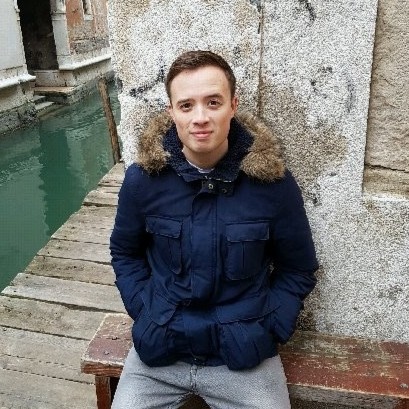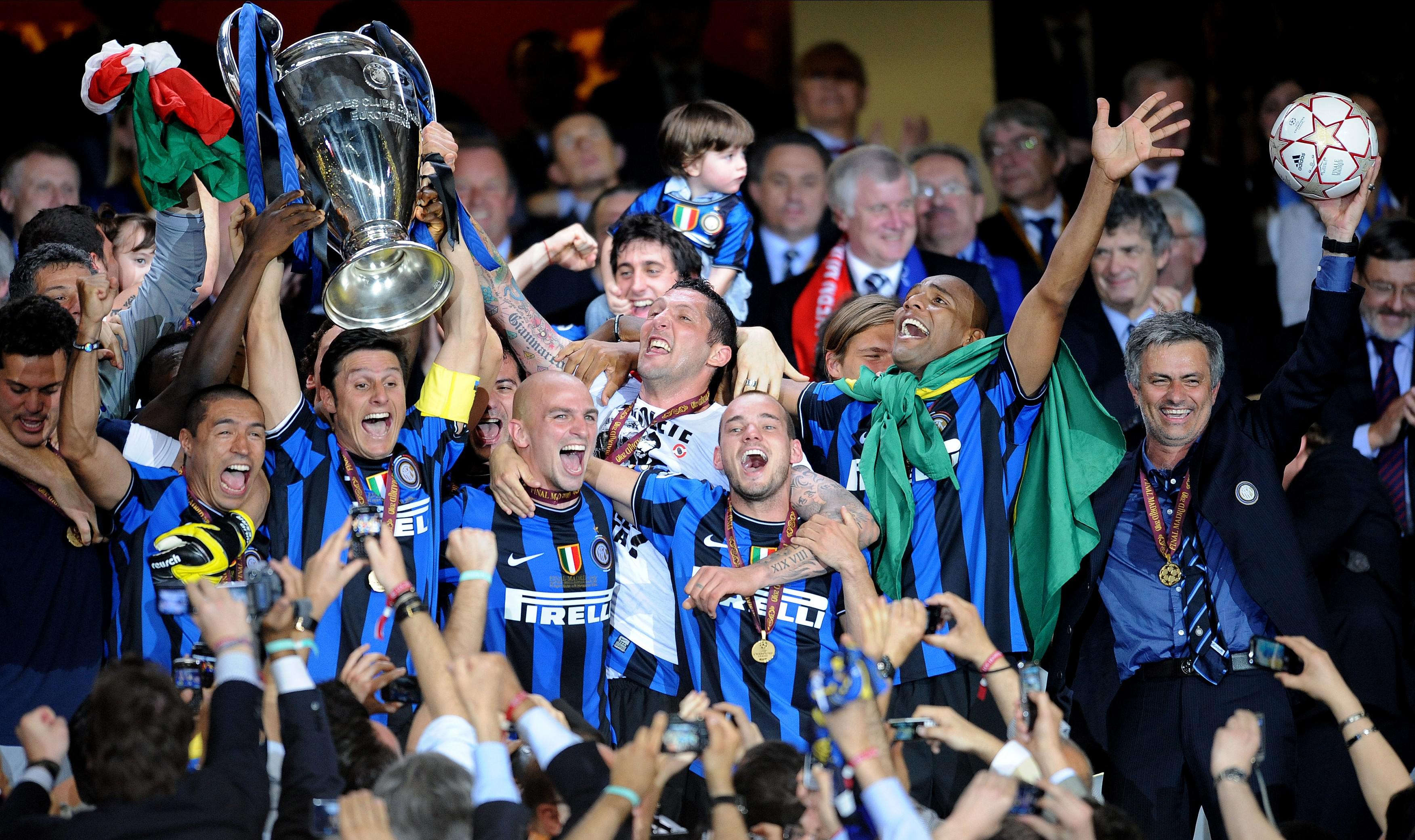FourFourTwo's 50 Best Football Managers in the World 2015: 35-31
Behold, the Premier League boss with a point to prove, the ex-flop who’s just led his invincibles to glory and this list’s youngest head honcho...
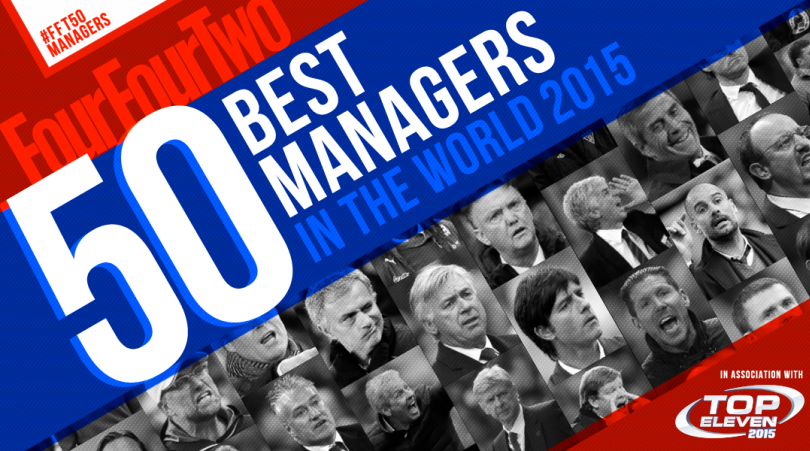
Words: Nick Ames, Greg Lea, Alex Holiga, Lee Roden, Martin Mazur.
35) Manuel Pellegrini (Man City)
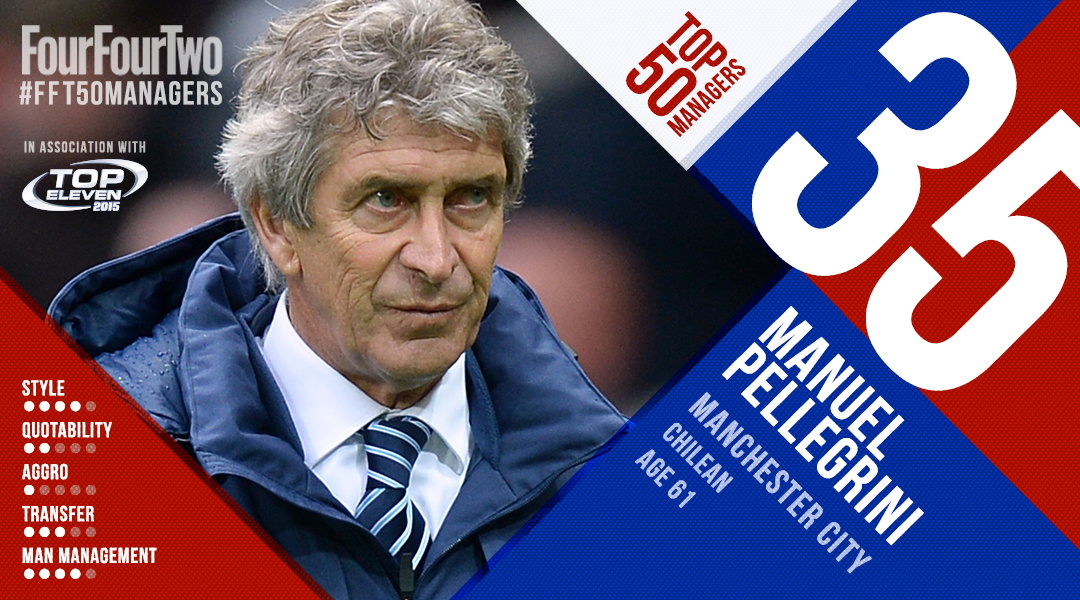
He doesn't shout too much, but if he's really upset he can raise his voice. That really has a big effect because it doesn’t happen all that often. A player with a big reputation will not bother him, not at all
Jose Mourinho may pretend to know him as ‘Pellegrino’, and a trophyless season at Manchester City may have piled the pressure on him, but the Chilean deserves to be regarded as one of the game’s greatest minds.
The league title Pellegrini won with City in 2013/14, his first at the Etihad, was significant: although he’d performed stupendously with Villarreal and Malaga in Spain, taking both unfancied clubs to the knockout stages of the Champions League, he was also harshly jettisoned by Real Madrid when Mourinho became available. There was a sense that he needed to get his feet under the table at a big club.
City played slick, rapid football under Pellegrini from the off. That hadn’t always been the case under his predecessor, Roberto Mancini, but they found things harder last term. Their title defence fell away dramatically and they were beaten by eventual winners Barcelona in the Champions League; at one point in the spring, Pellegrini looked like a dead man walking, but he will now be expected to lead a successful rebuild. Too many of his players looked jaded, out of form or uninterested as the season wore on, while the usually calm Pellegrini found himself drawn into spats with Mourinho. Improvement is needed to keep his job and, perhaps, his near-impeccable reputation. NA
34) Antonio Conte (Italy)
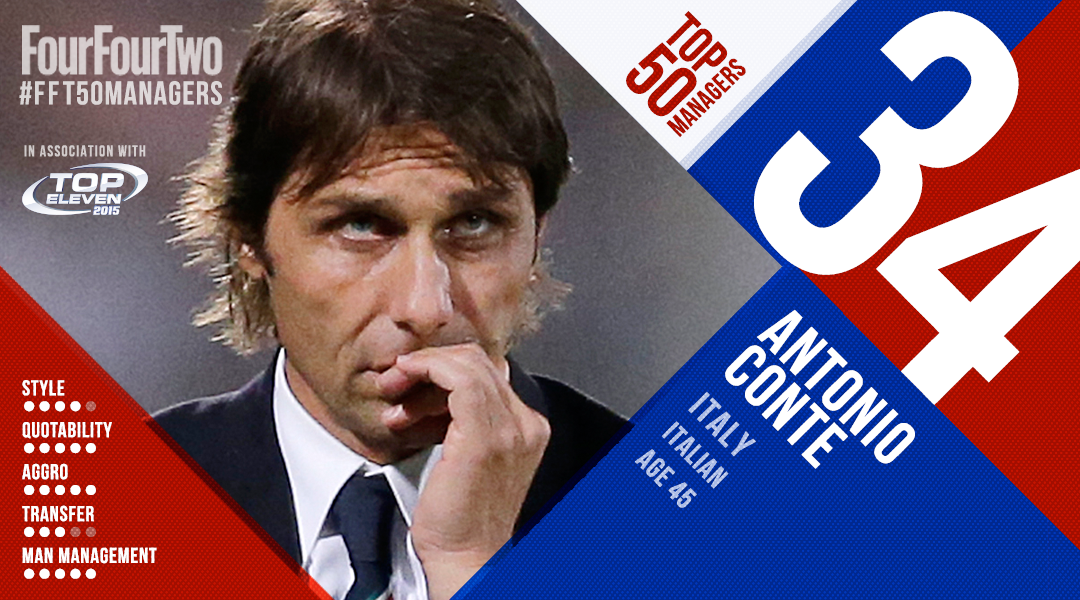
I'm extremely lucky I met Conte. I had so many coaches to compare him to and he is the one who surprised me the most. He becomes a beast. He’s never satisfied. The devil is always in the detail for him
As a former Juventus midfielder, captain and manager, Conte would have enjoyed his former side’s domestic double and run to the Champions League final last season. On a professional level, though, the Bianconeri’s successes in 2014/15 probably did him more harm than good.
Get FourFourTwo Newsletter
The best features, fun and footballing quizzes, straight to your inbox every week.
Conte did a tremendous job in Turin, restoring Juve to the pinnacle of Italian football by winning three successive scudetti. His record was tarnished only by an underwhelming showing in the European Cup: there was no shame in exiting in the quarter-finals to Jupp Heynckes’ Bayern Munich in 2013, but crashing out in the group stages after dropping points to Copenhagen and Galatasaray the following year was a little less excusable.
By reaching the final at the first time of asking, Max Allegri trod ground that Conte failed to, but the former’s achievements cannot be completely separated from the solid foundations built by the latter.
Now in charge of Italy, the 45-year-old has hitherto endured something of a bumpy ride in the qualification process for Euro 2016. He has, however, once again proven himself to be an excellent motivator and man-manager and, while he is clearly an intense and at times difficult character, there can be no doubting Conte’s managerial expertise. GL
33) Sergei Rebrov (Dynamo Kiev)
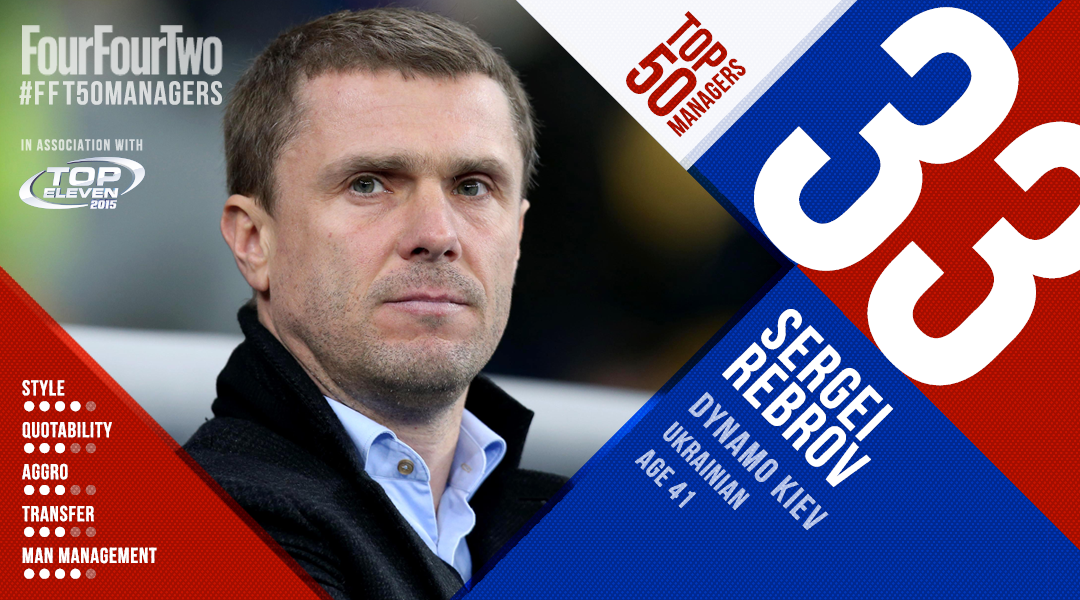
The change has been extraordinary. Everything is different: the training process, the atmosphere, the players' attitudes. The guys believe in their coach and play for him
The “Dry Years” was the term Ukrainian press used to describe the 2009-2014 period for Dynamo Kiev, the nation’s (and Europe’s) football giants. There were no trophies and the five years spent in the shadow of Shakhtar Donetsk, Dynamo’s biggest rivals, felt like an eternity.
But then a club legend with no previous coaching experience, a man who’d spent 13 years playing for Dynamo, took over as manager. Within a month of being appointed he brought them a cup, and the following season he won the double. True, Shakhtar spent all season in exile, playing in Lviv because of the war in their region; Metalist ran into serious financial trouble and Dnipro were perhaps distracted by their phenomenal run in Europe, but Rebrov’s boys stormed through the season without a single defeat in the league or cup.
Rebrov is rooted in the glorious traditions of the great Valeri Lobanovsky, but doesn’t simply follow his philosophy to the letter. Instead, he has been developing his own ideas within the standard 4-2-3-1 system, turning the team into a much more closely knit unit than was the case before and striving to make them great again. For a rookie manager, he has been wildly successful. AH
FEATURE How Spurs flop Rebrov overcame identity, war and Lobanovsky to rule Kiev
32) Vicente del Bosque (Spain)
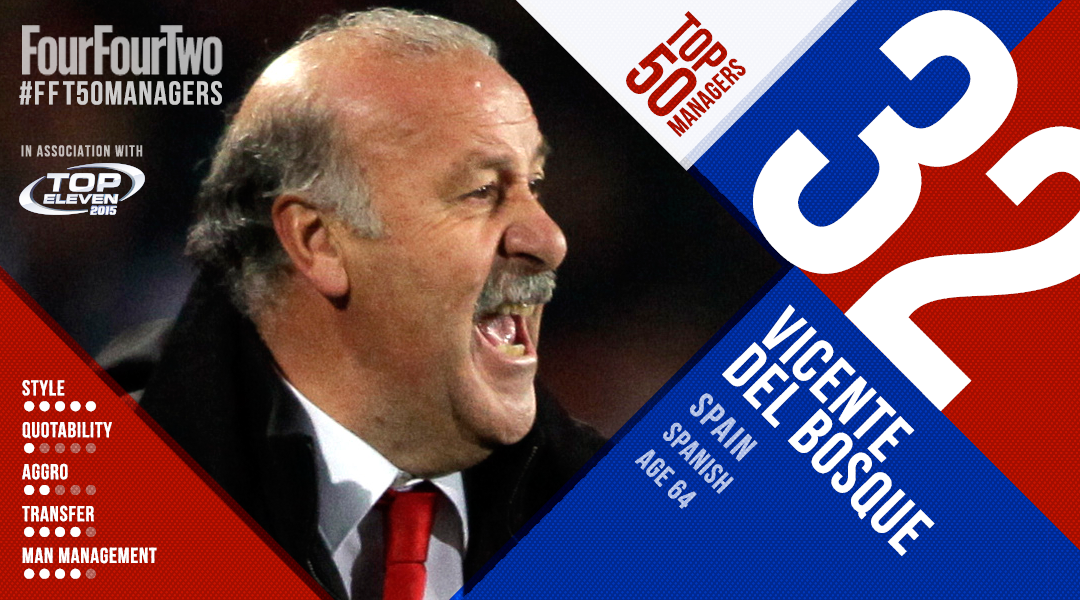
Del Bosque is the best thing that happened to Spain. He could have retired after the two big titles, and the last World Cup. But he continued straight ahead. We need a coach with authority, serenity, who is fair, reasonable, loved by players. That's him
Del Bosque has won every major trophy available as a club and international manager. Effectively, that means that at best he can match his previous achievements, yet never better them. When Spain exited the 2014 World Cup in humiliating circumstances, a lesser coach may have decided to cut his losses and bow out quietly without a fight. Instead, Del Bosque saw a new challenge he was hungry to tackle, deciding to take on the daunting task of re-building what was one of the finest international sides of all time.
The 64-year-old is often billed as a conservative, but if anything his refusal to let go of la Roja’s wheel in the stormiest of waters showed boldness and bravery. A willingness to experiment post-Brazil also reflects that. No fewer than 15 new players have been called up over the course of the last year, and the broadening of Del Bosque’s net to include those based in other nations like Italy and Germany, as well as discretely solid clubs like Malaga, proves that the wily old fox pays greater attention to talent outside of La Liga’s big three than some may think.
Spain are not yet back to their best, but Del Bosque is using all of the options at his disposal in an attempt to make it happen. For that he deserves credit. Other international managers are much less willing to take a risk. LR
31) Marcelo Gallardo (River Plate)
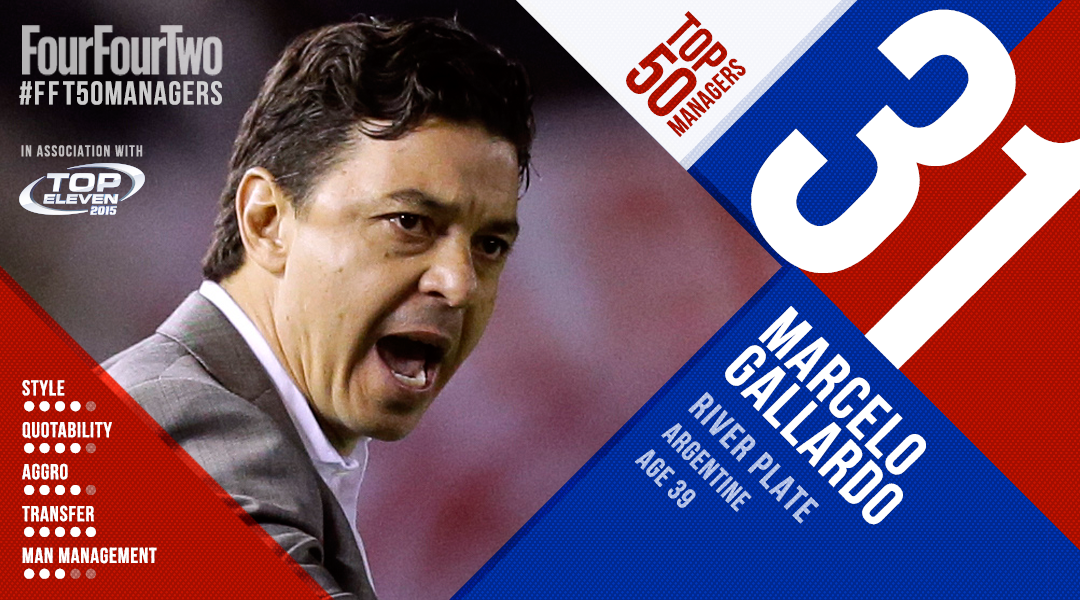
Gallardo is more than just an attacking coach. Sometimes there are coaches who believe they’re braver because they decide ‘to die with their boots on’. Really what you have to attempt is to not die…all systems are good if they are executed well
Gallardo is not just a football manager. He’s an urbanist who had to rebuild a club after a nuclear bomb had exploded. When River Plate were relegated in 2011 it looked like the world was over for their fans as they knew it. Matias Almeyda led them to promotion, Ramon Diaz, made them win a tournament again, but the metallic taste was still present in the stands.
The moment after Marcelo Gallardo took over, however, River seemed to rekindle their historic style. The 39-year-old, a club symbol who’d played an important part in their victories of the mid-1990s, had already enjoyed a successful coaching stint at Uruguay’s Nacional.
An admirer of Pep Guardiola, his impact from day one can only be compared to the Catalonian’s start at Barcelona. Gallardo managed to get the entire club aligned towards his project, and put a huge emphasis on the traditional River style: ball possession and lots of attacking. Within a year he’d managed to win the first Copa Sudamericana in the club’s history after victory over Boca Juniors in the semi-finals. River have reached the last four of this season’s Copa Libertadores after once again defeating their bitter rivals, this time after River players were attacked with pepper spray by Boca fans and the game was suspended.
He’s still compared to Guardiola, but in truth Gallardo – the youngest manager in FFT’s list – is closer to Mourinho in his intensity, tactics, signings and media handling. Not to mention his winning habit. MM
FFT's 50 Best Football Managers: 50-46 • 45-41 • 40-36 • 35-31 • 30-26 • 25-21 • 20-16 • 15-11 • 10 • 9 • 8 • 7 • 6 • 5 • 4 • 3 • 2 • 1
#FFT50MANAGERS See our full list of top 50 managers in the world and features on them here
Joe was the Deputy Editor at FourFourTwo until 2022, having risen through the FFT academy and been on the brand since 2013 in various capacities.
By weekend and frustrating midweek night he is a Leicester City fan, and in 2020 co-wrote the autobiography of former Foxes winger Matt Piper – subsequently listed for both the Telegraph and William Hill Sports Book of the Year awards.
